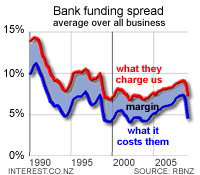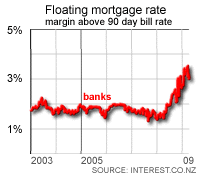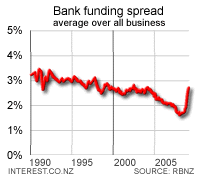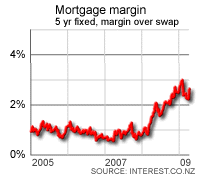 Reserve Bank Governor Alan Bollard was much more careful to question the rise in wholesale interest rates on Wednesday. Unlike some of the newspaper headlines, he did not take the extra step of criticising the banks directly. Now Bill English has gone that extra mile. Comments by a business lobby group and Federated Farmers late on Wednesday that banks were price gouging and misleading farmers have also opened up the debate. Bank workers union has also jumped on the bandwagon, calling for the banks to drop profit expectations. "It is time for banks to think not just about shareholders' dividends but about a social dividend. That means fairer interest rates and job security for New Zealand workers," said Finsec Campaigns Director Andrew Campbell. "Banks now enjoy significant support from taxpayers and reduced risk to shareholders, with few strings attached. A commitment to New Zealand jobs and a fair deal for customers should be conditions of the schemes," said Campbell. But is it true? Are the banks profiteering?
Reserve Bank Governor Alan Bollard was much more careful to question the rise in wholesale interest rates on Wednesday. Unlike some of the newspaper headlines, he did not take the extra step of criticising the banks directly. Now Bill English has gone that extra mile. Comments by a business lobby group and Federated Farmers late on Wednesday that banks were price gouging and misleading farmers have also opened up the debate. Bank workers union has also jumped on the bandwagon, calling for the banks to drop profit expectations. "It is time for banks to think not just about shareholders' dividends but about a social dividend. That means fairer interest rates and job security for New Zealand workers," said Finsec Campaigns Director Andrew Campbell. "Banks now enjoy significant support from taxpayers and reduced risk to shareholders, with few strings attached. A commitment to New Zealand jobs and a fair deal for customers should be conditions of the schemes," said Campbell. But is it true? Are the banks profiteering?  My short answer is yes, but not to a huge degree. They are protecting their profits and trying to grow them, but the growth is in the low single digit area percentage wise, which is not strong enough to use the profiteering tag. The latest round of mortgage rate hikes followed a spike in wholesale interest rates directly, which implies they were not 'profiteering hikes'. However, the banks are also now charging a higher margin over wholesale mortgage rates, but that can be partly justified by the extra costs they now face when borrowing offshore. Our research of all 3 and 5 year debt issues by our Australian owned banks and their parents show this funding margin over interbank swap (wholesale) rates has increased from around 10-15 basis points in March 2007 to around 150-170 basis points. That tallies with the jump shown left in the chart for floating vs 90 day bill rates. The average bank 5 year mortgage rate is around 7.5% right now, which is about 250 basis points over the 5 year swap rate. So there seems to be around 50-100 basis points of 'fat' in there over the 150-170 basis point increase in cost.
My short answer is yes, but not to a huge degree. They are protecting their profits and trying to grow them, but the growth is in the low single digit area percentage wise, which is not strong enough to use the profiteering tag. The latest round of mortgage rate hikes followed a spike in wholesale interest rates directly, which implies they were not 'profiteering hikes'. However, the banks are also now charging a higher margin over wholesale mortgage rates, but that can be partly justified by the extra costs they now face when borrowing offshore. Our research of all 3 and 5 year debt issues by our Australian owned banks and their parents show this funding margin over interbank swap (wholesale) rates has increased from around 10-15 basis points in March 2007 to around 150-170 basis points. That tallies with the jump shown left in the chart for floating vs 90 day bill rates. The average bank 5 year mortgage rate is around 7.5% right now, which is about 250 basis points over the 5 year swap rate. So there seems to be around 50-100 basis points of 'fat' in there over the 150-170 basis point increase in cost.  But figuring out what is the true profit margin is difficult, given the banks have a huge mix of funding costs and interest rates. There are apples and oranges and grapefruit all over the place. The Reserve Bank has a crack here (C10) and finds that the 'spread' between funding costs and claims (what they charge customers) has widened to 272 basis points by February from 175 basis points in July last year. However this measure does not include the cost of foreign currency funding, which makes up about 40% of funding, so it doesn't give the whole picture. Overall bank profits, which includes profits from fees as well as net interest margins, have been solid to slightly higher in the last year. We'll do some more research on the latest bank results later today. However, should their profits be lower? This would bring them into line with profits for other businesses, which are mostly sharply lower. And does English have a point in saying the government is guaranteeing them so should expect some leniency and profit sacrifice? I think the banks will have to cop this question. Once they took the guarantee, the must have known it would eventually come to this. It was never a gift. The banks are paying for the privilege with a 10 basis point fee, but some would say that's not nearly enough to cover the risks. Everyone who goes into debt to someone knows they eventually have some control over you. In a sense, Bill English became the bank manager to the banks when they took the government guarantee.
But figuring out what is the true profit margin is difficult, given the banks have a huge mix of funding costs and interest rates. There are apples and oranges and grapefruit all over the place. The Reserve Bank has a crack here (C10) and finds that the 'spread' between funding costs and claims (what they charge customers) has widened to 272 basis points by February from 175 basis points in July last year. However this measure does not include the cost of foreign currency funding, which makes up about 40% of funding, so it doesn't give the whole picture. Overall bank profits, which includes profits from fees as well as net interest margins, have been solid to slightly higher in the last year. We'll do some more research on the latest bank results later today. However, should their profits be lower? This would bring them into line with profits for other businesses, which are mostly sharply lower. And does English have a point in saying the government is guaranteeing them so should expect some leniency and profit sacrifice? I think the banks will have to cop this question. Once they took the guarantee, the must have known it would eventually come to this. It was never a gift. The banks are paying for the privilege with a 10 basis point fee, but some would say that's not nearly enough to cover the risks. Everyone who goes into debt to someone knows they eventually have some control over you. In a sense, Bill English became the bank manager to the banks when they took the government guarantee.  If the banks want to avoid this sort of political pain they should give up the guarantee. My overall feeling is our banks should share some more of the huge profit pain that other businesses are feeling, but taxpayers and customers shouldn't be baying for blood. We shouldn't forget our banks are very strong and are still growing lending at a time when banks in other countries are basket cases. Look at the carnage in the UK, US and European economies where their banks are essentially insolvent in the face of massive toxic debts. Here's my more detailed thoughts on that here in: 5 reasons to thank the banks and 5 reasons to spank the banks. Your thoughts? Comments below please
If the banks want to avoid this sort of political pain they should give up the guarantee. My overall feeling is our banks should share some more of the huge profit pain that other businesses are feeling, but taxpayers and customers shouldn't be baying for blood. We shouldn't forget our banks are very strong and are still growing lending at a time when banks in other countries are basket cases. Look at the carnage in the UK, US and European economies where their banks are essentially insolvent in the face of massive toxic debts. Here's my more detailed thoughts on that here in: 5 reasons to thank the banks and 5 reasons to spank the banks. Your thoughts? Comments below please
Have your say: Bill English says banks should accept lower profits
Have your say: Bill English says banks should accept lower profits
3rd Apr 09, 9:30am
by

We welcome your comments below. If you are not already registered, please register to comment
Remember we welcome robust, respectful and insightful debate. We don't welcome abusive or defamatory comments and will de-register those repeatedly making such comments. Our current comment policy is here.